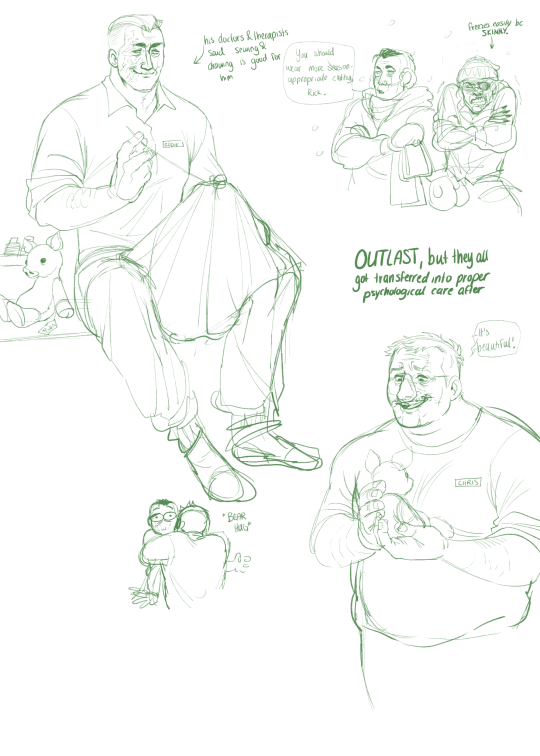Was 21 last time i updated this, may forget to do it again.
Don't wanna be here? Send us removal request.
Text
I don't usually reblog stories on this blog, but this story made my cry irl so.
.⠀⠀⠀ ू❀𝆬 𝐋𝐀𝐕𝐄𝐍𝐃𝐄𝐑 . ∔

⠀ ⠀❜❀⠀˙⠀simon "ghost" riley x fem!reader⠀(❁ᴗ͈ ᴗ͈)⠀˚
░⌦⠀ synopsis.⠀ ⠀domestic life with simon. 𖧷⠀⁺⠀
⠀. ⏝ི𓏶. ゜ imagine ⠀ being⠀ simon's ⠀wife⠀ ⋮
Simon didn’t think he could be a father. Not because he didn’t want to be—he did. Quietly, painfully. But he never believed he’d live long enough for it. He didn’t think there’d be a version of life where he could sit still, trade gunpowder for cradle songs, or let something so fragile as a child curl up on his chest and fall asleep without fear in the world. But then you came. And then… she did.⠀𓆉

He was terrified.
When you told him, his first reaction was silence. Heavy, still—the kind that made your skin crawl even though you knew he would never hurt you. He stared at the floor for a long time. Not out of anger. Not even shock. Just a weight pressing down on every piece of him, trying to make sense of a life where he could deserve something this soft.
He didn’t say anything for hours. But that night, while you lay in bed pretending to sleep, you felt his callused hand over your stomach. Gentle. Reverent. Like he thought he might break both of you.
“I’ll keep you safe,” he whispered so quietly, it could’ve been a prayer.
He wasn’t there when she was born.
Mission delays. A storm grounded his transport. He’d torn through his comms trying to reach anyone, anything—cursing the universe for making him a soldier first, father second.
But when he walked into that hospital room with dirt still on his boots and shadows under his eyes, and saw you holding her… saw her pink and alive and real in your arms…
He broke.
He didn't cry, not really. But his shoulders shook as he sat by your side and pressed his forehead to your temple. He stared at her like she was a ghost haunting his past—something he never thought he’d be allowed to touch.
“She’s so small,” he murmured, voice cracking.
“Yeah,” you replied.
That night, he didn’t sleep. Just watched her chest rise and fall, afraid to blink.
Simon was awkward at first.
He held her like she might detonate—arms stiff, movements cautious. Changing diapers felt like defusing bombs. And baby talk? Forget it. He read her the back of his cereal box in a low, gravelly voice, and she cooed like he was reciting poetry.
He wouldn’t say much, but he did. Morning bottles already warmed before you woke. Midnight pacing when she wouldn’t stop crying. One hand rubbing small circles on her back, the other gripping the baby monitor like a lifeline when he had to leave.
He taught her to crawl by laying on the floor with her, inching backward like it was a stealth op. When she took her first steps toward him, he froze. It felt like watching a sunrise you never thought you’d see.
She follows him everywhere.
Like a little ghost of her own.
He doesn’t let many people see her. Doesn’t post pictures. Doesn’t talk about her on base. But he keeps a small photo tucked behind his dog tags. If anyone catches a glimpse, they know not to ask.
She’s curious. Smart. A little quiet—like him. She watches everything. Studies the way he moves, tilts her head when he speaks like she’s decoding him. When she starts copying his dry, deadpan jokes, you swear Simon almost smiles.
He lets her paint his face with glitter and stars when she’s bored. He sits there stone-faced, letting her stick pink butterfly clips into his blond hair. If you ask why, he just shrugs:
“She wanted to. Didn’t wanna say no.”
He teaches her how to be strong—not cruel, not hardened, just aware. He teaches her to pay attention to exits, to trust her gut. When she has nightmares, he’s there before she can even call for him.
And when she asks him why he wears a mask sometimes, he kneels down and explains it gently. That some things are meant to protect, not hide. That it’s okay to be soft, but it’s also okay to be careful.
And then he lets her try it on. It drapes over her face like a cape. She laughs.
“Look, Daddy. I’m just like you!”
“No, sweetheart,” he says, and this time, he does smile—small, but real. “You’re stronger than I ever was.”
Simon is a man full of ghosts.
But when he’s with her, they quiet.
You’ve seen it.
The way his shoulders relax when she’s in the room. The way his voice drops softer when he reads to her. The way he presses his forehead to hers before he leaves, and whispers, “You be good for Mum, yeah? I’ll be back.”
He hates going.
Every goodbye leaves a crack in him.
But every return—when she runs to him screaming “Daddy!” and tackles his legs with her little arms—that’s what mends it.
He doesn’t know if he’s doing it right. He’s always afraid he’s too broken, too cold, too late. But you tell him he’s the safest place she knows.
And sometimes, when the house is quiet and she’s asleep in the next room, he’ll hold you close and whisper,
“Thank you.”
She’s eight now.
She tells people her dad is a superhero.
Simon doesn’t correct her.
He doesn’t know what version of him she’s seeing—what stories she’s crafted in her head to explain his scars or the way he flinches when doors slam too hard. She doesn’t know what he’s done. What he’s capable of. To her, he’s just… strong. Invincible. Safe.
He doesn’t deserve it. But he lives for it.
There are nights when the house is quiet and warm and she’s tucked beneath her galaxy-print bedsheets, one arm flung off the mattress and glitter nail polish chipped from the day.
And he’ll sit outside her room. In the hallway. Hands clenched between his knees.
He listens to her breathe.
He doesn't know why he tortures himself like that—why he waits for nightmares that never come, or for screams she’s long since outgrown. Maybe he’s still waiting for the other shoe to drop. Maybe he’s waiting to fail her. Like he failed his family. His brother. Himself.
He’ll sit there until his knees ache. Until the silence starts to feel like mercy again.
Then he goes to bed, lays next to you, and stares at the ceiling like there’s a sniper on the roof. Like peace is a trap he’s too smart to fall for.
She was never supposed to see it.
An old flash drive. Left in a drawer he thought was too high. She’d plugged it into her school laptop, probably looking for cartoons.
She didn’t say anything until hours later. She was quiet. Paler than usual.
“Daddy… you hurt bad people, right?”
He froze.
“…What’d you see, love?”
“Some men. You hurt them. But… you were saving someone, weren’t you?”
There was no panic in her voice. No fear. Just a question, small and sincere, wrapped in child-logic and trust.
Simon knelt in front of her. Took both her hands in his. Looked her in the eye like it was the most sacred thing he’d ever done.
“Yes,” he said. “I hurt bad people. I’ve done things I’m not proud of. Things I’d never want you to see. But I’ve never hurt someone innocent. Never would.”
She nodded slowly. And then—God, kids are strange—she just reached out and touched the scar on his cheek, the one beneath the corner of his eye.
“I’m not scared of you,” she said softly. “You’re my hero.”
And that was the first time in his life Simon wanted to cry in front of someone.
He held her so tight that night, you thought she might get smothered. But she clung to him too—arms around his neck like an anchor, like she’d never let go.
She gets more clever every year.
She steals his hoodies. Starts hiding his mask in ridiculous places—like the freezer, or under her bed—just to see how long it takes him to find it. She claims it’s to “keep him home longer.”
He pretends to be annoyed.
“You’re a little brat,” he mutters, tossing her over his shoulder.
“I'm baby!” she giggles back, kicking her legs.
They have their own games. Their own signals. A whole silent language between them. When she’s nervous at school, she touches her wrist twice—it means “I wish you were here.” When he’s home late from a mission, she leaves a plastic dinosaur on the kitchen table—it means “I waited.”
She tells him she wants to be like him.
A protector. A fighter.
He tells her she already is.
But inside, the thought terrifies him.
You’re the one who packs his bag now. She won’t help anymore. Not since last time.
She’d cried so hard she threw up. Told him he promised he’d stay longer. That “longer” shouldn’t mean “only six days.” She was angry in that way only children can be—grief-stricken and pure.
“I hate the army,” she said, clutching the edge of his vest.
He knelt again. Always kneeling, always trying to shrink himself to meet her where she is.
“You don’t have to understand, love. But I hope one day… you’ll forgive me for missing things.”
She didn’t answer. Just turned and ran to her room.
He left anyway. And it broke him.
He kept her crayon drawing in his vest pocket the whole mission. Folded and faded. A stick figure version of him holding hands with her beneath a smiling sun.
It’s still there.
And when he comes back, It’s always late.
You’ll hear the gate creak. The boots on the gravel. She’ll fly out of bed before you can stop her—barefoot and wild-haired, running down the stairs.
He drops everything to catch her.
She wraps herself around him like a vine. He doesn’t even get the mask off before her little arms are around his neck and she’s whispering “I missed you I missed you I missed you” like a spell.
“I missed you too, sweetheart.”
He holds her like she’s the only thing tying him to earth. And maybe she is.
Teenage girls are loud in their silence.
Simon learned that the hard way.
She doesn’t slam doors or scream. She doesn’t yell “You don’t understand!” or throw things across the room. She just gets quiet. Withdraws. Answers in clipped syllables, disappears into her hoodie, headphones in, eyes distant.
She used to run to him the second he came home. Now she doesn’t even look up from her phone.
She’s fifteen.
And sometimes, Simon thinks she’s slipping through his fingers, and he’s got nothing left but shadows and memory.
It started small.
She stopped asking him to braid her hair before bed. Said she could do it herself. She stopped leaving dinosaurs on the kitchen table. Stopped leaving notes in his rucksack.
He knew it wasn’t personal.
It was growing up.
But that didn’t make it easier.
“Give her space,” you told him gently. “She’s figuring herself out.”
He tried. He really did.
But he couldn’t help hovering near her doorway some nights, watching her back hunched over a laptop, music playing softly. Wondering if she still remembered how he used to sing to her in a voice barely above a whisper when she couldn’t sleep. Wondering if she remembered why he was gone so often.
Wondering if she still thought he was her hero.
It came up one night, out of nowhere.
She was setting the table. He’d been home for five days. The air was calm, the routine safe. And then:
“Do you wear the skull mask because you want to scare people?”
He looked up from the sink, heart stalling for a second.
He turned off the water. Dried his hands slowly. Looked her in the eye.
“No,” he said after a long pause. “I wear it because I used to think I was already dead.”
She blinked.
Didn’t say anything.
He almost regretted being honest.
“But then…” His voice caught. “Then I had you.”
The silence that followed was thick. Fragile.
And then she whispered:
“You’re not dead.”
He cleared his throat, chest aching. “No. Not anymore.”
She set down a fork.
Walked over.
And, for the first time in months, hugged him without needing a reason.
He didn’t let go for a long time.
The hardest part of fatherhood for Simon isn’t leaving. It’s letting her live.
She’s starting to go out more now. With friends. Late bus rides. Music festivals. Sleepovers at houses he doesn’t know.
He doesn’t sleep well on those nights.
You can see it—the way his leg bounces, the way he checks the time every fifteen minutes, the way he keeps his phone unlocked, her tracker app open on the screen.
“She’s not a target,” you remind him. “She’s a kid.”
But in his world, innocence doesn’t mean safety.
And light doesn’t mean there’s no danger.
When she comes home, he does the same ritual every time:
One look over her face.
A glance at her hands.
Eyes flicking to her shoes, her wrists, her neck.
A checklist of survival. It takes seconds. She doesn’t even notice.
But he does.
Only when he’s sure she’s safe does he let himself exhale.
The first time she really breaks—it’s quiet.
She comes home from school, bags under her eyes, and says: “I don’t think anyone really likes me.”
Simon is at the table cleaning a rifle.
But he puts it down immediately.
And for a long time, they just sit on the couch. Side by side. She doesn’t cry. He doesn’t pry. Eventually, she says, “I feel like I’m too much for people. Too weird.”
He looks at her then. Really looks.
And in the softest voice he can manage, he says:
“You’re not too much. The world’s just too loud.”
She leans into him.
He lets her.
She’s taller now, but somehow still fits under his arm.
“I don’t know how to be normal.”
He smiles, brushing her hair back behind her ear.
“Good. Normal’s overrated.”
She laughs, watery and real.
It’s the sound of his heart stitching back together.
Simon isn’t great with words. Not the soft ones, anyway.
But he shows her love in the way he always waits up.
In the way he replaces the lightbulb in her lamp before it burns out.
In the way he gives her his old hoodie when she’s sick and lets her keep it.
In the way he memorizes the names of her friends. Learns their schedules. Watches over them from a distance like a silent guardian.
She doesn’t say “I love you” as often as she used to.
But when she falls asleep in the car and mumbles “Dad” like it’s home…
He knows.
He knows.
She’s not a child anymore.
But she’ll always be his little girl.
And he’ll always be the ghost at her back—quiet, watchful, loyal.
Not haunting her.
Protecting her.
Always.
He never taught her how to drive.
You did.
She insisted.
He didn’t mind. Truthfully, the thought of her behind the wheel made his pulse spike. Not because he didn’t trust her, but because he knew the world. Knew how quickly things turned. He could pull a man out of a wrecked Humvee, but the idea of her skidding into a light pole because of wet asphalt made his vision go white.
So he let you take her.
Watched from the window.
She waved at him once from the driver’s seat, grinning like she owned the road.
And he waved back. Small, barely-there.
But it was enough.
It was always enough.
The house is quieter now.
She’s twenty-three.
Lives two cities over. Has a dog. A job. A life.
She comes home when she can, which isn’t often. You say that’s normal. That’s what kids do. But he still checks the front window around five every evening. Still listens for the sound of a key turning in the lock that doesn’t come.
He still sets her place at the table when you aren’t looking.
You find the folded napkins sometimes. The extra fork. He never explains. You don’t ask.
She doesn’t call him "daddy" anymore.
That’s what time does.
It sands things down.
She calls him Dad now. Or Old Man if she’s feeling playful.
He likes it. But it stings in a quiet way. Like finding an old picture and realizing you don’t remember the moment it captured.
There are still hugs. Still warmth. But she doesn’t cling to him anymore. Doesn’t bury her face in his neck. Doesn’t fall asleep on his chest while he reads boring manuals aloud to lull her.
Instead, she brings over wine. Talks about work. Politics. The rent.
She’s brilliant. Composed. Fierce in a way that reminds him of a younger you.
And sometimes, when she laughs, he sees the little girl she used to be—cheeks round, eyes bright, hands sticky from jam.
Then the moment fades.
And she’s grown again.
He doesn’t go on missions anymore.
Retired now. Officially.
He didn’t tell her right away. Wasn’t sure how. He expected a celebration, or at least a toast.
But when he finally said it over dinner—softly, plainly: “I’m done. Hung it up.”—she looked at him for a long moment. Then nodded.
“Good,” she said. “You were always more than that.”
He looked at her then—really looked—and realized she hadn’t seen him as a soldier in years.
She’d seen the man.
The father.
The one who tucked her in and stitched her broken toys and waited outside ballet recitals with bloodied knuckles he never explained.
He had been trying so hard to protect her from the world.
But she’d been watching him—all this time.
Learning how to survive by the way he loved her.
One night he got sick.
It wasn’t life-threatening. Just a flu.
But he hadn’t been sick in years, and it hit him harder than expected.
She came home that weekend without asking.
Let herself in. Took one look at him bundled in blankets on the couch and said, “You look like shit.”
He coughed. “Nice to see you too.”
But her hands were gentle. She made him tea. Sat on the armrest of the couch, fingers brushing over his forehead like she was checking for fever the way he used to when she was small.
She stayed the night. Slept on the floor beside him like a sentry.
He woke at 3 a.m. and saw her curled up in an old hoodie of his, her phone clutched in one hand, screen still lit with some half-written message.
And for a second—just a flicker—he wished she were small again.
Not because he didn’t love who she’d become.
But because that time was so brief.
So unbearably sweet.
And it was gone.
It was raining.
She stood beside him under a grey sky, both in black, her hand tucked into the crook of his elbow.
It was his brother’s grave. The one he used to visit alone.
“I wish I’d met him,” she said quietly.
“He would’ve loved you,” Simon replied. “You’ve got his mouth. Same sarcasm.”
She smiled through the tears. Leaned her head against his shoulder.
“Do you ever miss being young?”
He didn’t answer right away. Rain hit the stone like fingers drumming.
“I miss you being young,” he finally said.
And she didn’t speak again. Just held his arm tighter.
One day, it happens.
She calls him—voice shaking, words rushed. Something about a near-accident. Someone ran a red light. Her hands were shaking. She didn’t know who else to call.
And Simon?
He was already in the car before she finished the sentence.
He found her on a curb, hands trembling around a coffee cup someone had handed her. He didn’t ask questions. Just crouched in front of her and pulled her into his arms.
She broke. Sobbed into his coat like she was twelve again.
Like she was small and scared and needed her dad.
And he just held her.
Kept one hand on the back of her head.
The other over her heart.
“You’re safe,” he murmured. “I’ve got you.”
Later that night, she curled up on his old couch, wrapped in his blanket, and whispered,
“I didn’t want to call you. Thought I was too old.”
He shook his head.
“You’ll never be too old to be my girl.”
And one day…
One day, it’s just the two of them on the porch.
You’re inside baking. The sun’s going down. Her eyes are softer now.
She says, “Do you ever think you could’ve had a normal life?”
He doesn’t answer at first.
Just watches the wind move through the trees.
Then:
“This is normal. For me.”
She leans her head on his shoulder.
He doesn’t flinch anymore when touched. Not by her.
“You were always enough, you know,” she says.
He swallows. Tries to look away. Fails.
And then she adds, quieter, “You saved me. Even when I didn’t know I needed saving.”
He closes his eyes.
Because in that moment, it doesn’t matter what he’s done.
Who he’s killed.
What haunts him.
Because this is what remains.
This girl. This woman. This life they made.
And that… is enough.
He never thought he’d grow old.
Never imagined it.
He used to think men like him didn’t make it past 40 — not without a bullet or a blaze or a quiet disappearance somewhere no one would bother looking. There was always something inside him waiting for it — like his bones expected to be abandoned.
But now?
Now his body aches in new ways.
His knees click when he gets up too fast.
The hair at his temples has gone silver, and his hands have lost their steady, deadly stillness.
But you’re still here.
Still brushing your teeth beside him. Still humming while folding sheets. Still asking if he wants tea or if his shoulder hurts when it rains.
And it guts him. Every single time.
That you stayed.
That you chose to grow old next to a man who never expected to live long enough to deserve it.
Your love has changed.
It’s not fireworks now. Not firelight and breathless kissing in hotel rooms after too-long deployments.
It’s quieter. But deeper. Warmer.
It’s how you always leave the light on for him, even when he forgets to ask.
It’s how he sets out your slippers without thinking, so your feet don’t touch the cold floor in the morning.
It’s how you never ask where he’s going when he disappears into the garage, and how he never questions the way you cry at old home videos, even though you’ve seen them a hundred times.
There’s a kind of intimacy now that goes deeper than touch.
A knowing.
A weightless ease, like your hearts have learned how to lean on each other without needing to speak.
You’ll brush past him in the kitchen, and he’ll place a hand on the small of your back — not to move you, not to guide you, but just to feel you. To remind himself you’re real. Here.
Still his.
Sometimes he just watches you.
He won’t say it out loud. He’s too old for poetry, and too hardened for flowery things. But sometimes, when you’re reading by the window, your glasses slipping down your nose and the light touching your cheek just right—
He stares at you like you’re something holy.
Like you're the last beautiful thing left in a world he once thought he’d never understand.
He’ll pretend to be half-asleep on the couch, or too focused on whatever’s in his hands — but he’s watching you. Memorizing you again and again, like a man trying to hold onto something too big to keep.
Because he knows.
He knows time takes things.
He’s lost too many people to pretend otherwise.
So he watches. And he commits you to memory. Every wrinkle near your eyes. Every gray strand of hair. Every sigh. Every smile.
You catch him sometimes. And he always looks away like a boy caught daydreaming.
“You’re staring,” you tease.
He shrugs. “I always do.”
He still has the mask.
It’s in a box now. Top of the closet. Buried under old jumpers and Christmas decorations.
You told him he didn’t need it anymore, and he agreed.
But he kept it. Quietly. Respectfully.
You found him once, years ago, just sitting with it in his lap. The house was silent. The air still.
You didn’t say anything. Just sat beside him.
He looked at you, eyes far away, voice quieter than you’d ever heard.
“I wore this to keep the world out,” he said. “But somehow, you still found your way in.”
And you leaned against him.
And he let you.
And neither of you moved for a long time.
He loves you differently now.
Not less. Not softer.
But heavier.
There’s a weight to it now. A depth.
He knows what it means to have someone for a lifetime. He knows what it costs to stay — what it takes to love a man who wakes from nightmares, who still pauses at loud noises, who forgets he’s safe even now.
And he sees what it cost you, too.
He saw it in your eyes when the baby was crying and he wasn’t home.
Saw it when you had to explain to your daughter why “daddy” missed her school recital.
Saw it in the way you smiled through the loneliness, always so patient, always so good.
He never said thank you. Not enough.
So now he shows it.
In every slow dance in the kitchen.
In every cup of tea made before you ask.
In every time he reaches for your hand during a movie, just to feel your fingers between his.
He asks you one night.
“Do you regret it?”
It’s late. The moonlight’s dripping through the window, and the sheets are tangled between your legs. You’re half-asleep, but his voice pulls you back.
You turn toward him. Find him already watching you.
“All of it,” he says, quietly.
And you reach for him, tuck your fingers beneath his chin like you did when you were younger. His beard is whiter now. His eyes softer.
“I’d do it all over again,” you say.
And he believes you. With every beat of his scarred, stubborn heart.
You fall asleep like that — your fingers in his, your breath slow against his skin.
And somewhere in the dark, in a house full of years and silence and everything you've both endured...
Simon smiles.
Because in the end, despite everything he’s done, everything he’s lost—
You stayed.
And that made all the difference.
It starts with small things.
Keys. Names.
What day it is.
Where he left his book.
At first, you joke about it. Call it “old man brain,” and he chuckles, rubbing the back of his neck, muttering something about brain damage and too many concussions.
But then he starts calling the dog by the wrong name.
Asks where your daughter is — even though she just called.
He forgets the kettle is on.
Leaves the tap running.
Stares at the cupboard, confused, trying to remember why he opened it.
And one day, you find him standing in the hallway, still as stone, holding one of her baby toys in his hand.
“She used to chew on this,” he says, quiet, “didn’t she?”
You nod.
“She’s twenty-seven now, Simon.”
He blinks at the toy.
“Oh.”
You learn his patterns.
He doesn’t like loud noises anymore.
Doesn’t like too many people in the house.
Gets tired easily. Confused quickly. Frustrated at himself more than anything.
But he’s still him.
He still drinks his tea the same way. Still looks for your hand under the blanket when you watch old movies. Still walks beside you in the garden, pointing at flowers like he remembers what they’re called — even if he doesn’t.
“Is that one the… the purple one?” he asks.
You smile. “Lavender.”
“Right. Right, I knew that.”
He didn’t.
But he likes when you pretend he did.
Sometimes he has bad days.
Days where he wakes up and doesn’t know where he is.
Days when he looks at you and his face folds — not in anger, but in heartbreak.
“I’m supposed to know you,” he says once, voice shaking. “Aren’t I?”
You take his hands. Place them on your cheeks. Let him feel the shape of your face.
“You do. You always have.”
He breathes in, trembling.
“I’m scared, love.”
“I know,” you whisper. “It’s okay. I’m not going anywhere.”
And you don’t.
You never do.
But there are still good days.
Days when he laughs at your terrible jokes.
When he remembers how to make your tea before you do.
When he tells you a story from the army — one he swore he’d forgotten.
And there are still evenings where he pulls you in, slow and careful, kisses the corner of your mouth and says,
“Still the prettiest thing I’ve ever seen.”
“Even with the wrinkles?” you tease.
“Especially with them,” he grins.
You cry in the kitchen after that one.
Quietly.
Not because you’re sad.
But because you still get to have this.
And then one morning, he doesn’t know your name.
He wakes with a start. Looks at you.
And doesn’t say anything.
Not confusion. Not fear. Just… blankness.
You speak gently. Smile.
Tell him your name like it’s the first time.
Tell him you’re safe. That he is too.
And he nods.
“Alright. If you say so.”
But later — later that same day — when you bring him tea, he takes your hand and murmurs:
“Thank you, sweetheart.”
You freeze.
“Do you know who I am?”
He blinks. Thinks.
“No. But I know I love you.”
The days stretch longer now.
He’s quieter, softer — not from peace, but from the slow unraveling of time. There are whole mornings where he doesn’t speak at all. Just watches the trees, the clouds, your hands in the garden. Like his soul has moved somewhere deep inside, and he’s just floating now.
He forgets more often than he remembers.
But he still holds your hand.
Even when he doesn’t know who you are, he finds your fingers. Rubs his thumb over your knuckle. Leans into your shoulder like a man who’s known only one comfort in his entire life.
And he has.
You.
He sleeps more now.
Sometimes all day.
You sit with him. Read aloud. Tell stories he once told you. Some of them are true, some of them aren’t — he wouldn’t correct you now even if he knew.
But he smiles sometimes. At the sound of your voice.
Like part of him — the part too deep to lose — still knows you.
And when he wakes, slow and blinking, he always asks:
“You’re still here?”
And you always answer, soft and warm:
“I’ve always been here.”
It happens on a rainy morning.
There’s nothing dramatic about it.
No gasp. No panic. No final words.
Just a stillness.
You wake first. His hand is still wrapped around yours. His chest still, his face soft, relaxed — like he simply drifted somewhere quieter. Somewhere gentler.
He doesn’t look afraid.
He looks young.
Somehow.
Like the weight finally left him.
And for a long, long time, you don’t move.
You just rest your head on his chest, where his heartbeat used to be, and whisper the only thing that ever mattered:
“You made it, Simon. You’re safe now.”
You bury him beside the lavender.
The spot he always loved — where the bees hummed and the light hit just right in spring.
Your daughter helps. The grandkids each place a flower on the earth. You keep your hand on the stone long after everyone else has gone.
There’s no mask on it. No rank. No war stories.
Just:
Simon Riley
Beloved Husband. Father. Safe, at last.
And you keep living.
Not out of duty.
Not out of guilt.
But because he would want you to.
You still drink your tea the way he made it.
Still hum old songs while folding the laundry.
Still leave the porch light on, out of habit.
Some nights, you sit alone with the rain on the window and close your eyes — and you swear you feel it:
His hand on your shoulder.
The breath of him.
The warmth.
You speak into the dark like he’s still beside you.
“I’ll be there soon. Not yet. But soon.”
Because real love never ends.
And the life you built together — the quiet, the pain, the laughter, the child, the years — it doesn’t vanish when he goes.
It lives in you.
In your daughter.
In every soft, ordinary, beautiful thing he once thought he could never have.
Simon made it home.
And home was always you.

do not repost, modify, translate or plagiarize in any way on any platforms.
587 notes
·
View notes
Text
.⠀⠀⠀ ू❀𝆬 𝐋𝐀𝐕𝐄𝐍𝐃𝐄𝐑 . ∔

⠀ ⠀❜❀⠀˙⠀simon "ghost" riley x fem!reader⠀(❁ᴗ͈ ᴗ͈)⠀˚
░⌦⠀ synopsis.⠀ ⠀domestic life with simon. 𖧷⠀⁺⠀
⠀. ⏝ི𓏶. ゜ imagine ⠀ being⠀ simon's ⠀wife⠀ ⋮
Simon didn’t think he could be a father. Not because he didn’t want to be—he did. Quietly, painfully. But he never believed he’d live long enough for it. He didn’t think there’d be a version of life where he could sit still, trade gunpowder for cradle songs, or let something so fragile as a child curl up on his chest and fall asleep without fear in the world. But then you came. And then… she did.⠀𓆉

He was terrified.
When you told him, his first reaction was silence. Heavy, still—the kind that made your skin crawl even though you knew he would never hurt you. He stared at the floor for a long time. Not out of anger. Not even shock. Just a weight pressing down on every piece of him, trying to make sense of a life where he could deserve something this soft.
He didn’t say anything for hours. But that night, while you lay in bed pretending to sleep, you felt his callused hand over your stomach. Gentle. Reverent. Like he thought he might break both of you.
“I’ll keep you safe,” he whispered so quietly, it could’ve been a prayer.
He wasn’t there when she was born.
Mission delays. A storm grounded his transport. He’d torn through his comms trying to reach anyone, anything—cursing the universe for making him a soldier first, father second.
But when he walked into that hospital room with dirt still on his boots and shadows under his eyes, and saw you holding her… saw her pink and alive and real in your arms…
He broke.
He didn't cry, not really. But his shoulders shook as he sat by your side and pressed his forehead to your temple. He stared at her like she was a ghost haunting his past—something he never thought he’d be allowed to touch.
“She’s so small,” he murmured, voice cracking.
“Yeah,” you replied.
That night, he didn’t sleep. Just watched her chest rise and fall, afraid to blink.
Simon was awkward at first.
He held her like she might detonate—arms stiff, movements cautious. Changing diapers felt like defusing bombs. And baby talk? Forget it. He read her the back of his cereal box in a low, gravelly voice, and she cooed like he was reciting poetry.
He wouldn’t say much, but he did. Morning bottles already warmed before you woke. Midnight pacing when she wouldn’t stop crying. One hand rubbing small circles on her back, the other gripping the baby monitor like a lifeline when he had to leave.
He taught her to crawl by laying on the floor with her, inching backward like it was a stealth op. When she took her first steps toward him, he froze. It felt like watching a sunrise you never thought you’d see.
She follows him everywhere.
Like a little ghost of her own.
He doesn’t let many people see her. Doesn’t post pictures. Doesn’t talk about her on base. But he keeps a small photo tucked behind his dog tags. If anyone catches a glimpse, they know not to ask.
She’s curious. Smart. A little quiet—like him. She watches everything. Studies the way he moves, tilts her head when he speaks like she’s decoding him. When she starts copying his dry, deadpan jokes, you swear Simon almost smiles.
He lets her paint his face with glitter and stars when she’s bored. He sits there stone-faced, letting her stick pink butterfly clips into his blond hair. If you ask why, he just shrugs:
“She wanted to. Didn’t wanna say no.”
He teaches her how to be strong—not cruel, not hardened, just aware. He teaches her to pay attention to exits, to trust her gut. When she has nightmares, he’s there before she can even call for him.
And when she asks him why he wears a mask sometimes, he kneels down and explains it gently. That some things are meant to protect, not hide. That it’s okay to be soft, but it’s also okay to be careful.
And then he lets her try it on. It drapes over her face like a cape. She laughs.
“Look, Daddy. I’m just like you!”
“No, sweetheart,” he says, and this time, he does smile—small, but real. “You’re stronger than I ever was.”
Simon is a man full of ghosts.
But when he’s with her, they quiet.
You’ve seen it.
The way his shoulders relax when she’s in the room. The way his voice drops softer when he reads to her. The way he presses his forehead to hers before he leaves, and whispers, “You be good for Mum, yeah? I’ll be back.”
He hates going.
Every goodbye leaves a crack in him.
But every return—when she runs to him screaming “Daddy!” and tackles his legs with her little arms—that’s what mends it.
He doesn’t know if he’s doing it right. He’s always afraid he’s too broken, too cold, too late. But you tell him he’s the safest place she knows.
And sometimes, when the house is quiet and she’s asleep in the next room, he’ll hold you close and whisper,
“Thank you.”
She’s eight now.
She tells people her dad is a superhero.
Simon doesn’t correct her.
He doesn’t know what version of him she’s seeing—what stories she’s crafted in her head to explain his scars or the way he flinches when doors slam too hard. She doesn’t know what he’s done. What he’s capable of. To her, he’s just… strong. Invincible. Safe.
He doesn’t deserve it. But he lives for it.
There are nights when the house is quiet and warm and she’s tucked beneath her galaxy-print bedsheets, one arm flung off the mattress and glitter nail polish chipped from the day.
And he’ll sit outside her room. In the hallway. Hands clenched between his knees.
He listens to her breathe.
He doesn't know why he tortures himself like that—why he waits for nightmares that never come, or for screams she’s long since outgrown. Maybe he’s still waiting for the other shoe to drop. Maybe he’s waiting to fail her. Like he failed his family. His brother. Himself.
He’ll sit there until his knees ache. Until the silence starts to feel like mercy again.
Then he goes to bed, lays next to you, and stares at the ceiling like there’s a sniper on the roof. Like peace is a trap he’s too smart to fall for.
She was never supposed to see it.
An old flash drive. Left in a drawer he thought was too high. She’d plugged it into her school laptop, probably looking for cartoons.
She didn’t say anything until hours later. She was quiet. Paler than usual.
“Daddy… you hurt bad people, right?”
He froze.
“…What’d you see, love?”
“Some men. You hurt them. But… you were saving someone, weren’t you?”
There was no panic in her voice. No fear. Just a question, small and sincere, wrapped in child-logic and trust.
Simon knelt in front of her. Took both her hands in his. Looked her in the eye like it was the most sacred thing he’d ever done.
“Yes,” he said. “I hurt bad people. I’ve done things I’m not proud of. Things I’d never want you to see. But I’ve never hurt someone innocent. Never would.”
She nodded slowly. And then—God, kids are strange—she just reached out and touched the scar on his cheek, the one beneath the corner of his eye.
“I’m not scared of you,” she said softly. “You’re my hero.”
And that was the first time in his life Simon wanted to cry in front of someone.
He held her so tight that night, you thought she might get smothered. But she clung to him too—arms around his neck like an anchor, like she’d never let go.
She gets more clever every year.
She steals his hoodies. Starts hiding his mask in ridiculous places—like the freezer, or under her bed—just to see how long it takes him to find it. She claims it’s to “keep him home longer.”
He pretends to be annoyed.
“You’re a little brat,” he mutters, tossing her over his shoulder.
“I'm baby!” she giggles back, kicking her legs.
They have their own games. Their own signals. A whole silent language between them. When she’s nervous at school, she touches her wrist twice—it means “I wish you were here.” When he’s home late from a mission, she leaves a plastic dinosaur on the kitchen table—it means “I waited.”
She tells him she wants to be like him.
A protector. A fighter.
He tells her she already is.
But inside, the thought terrifies him.
You’re the one who packs his bag now. She won’t help anymore. Not since last time.
She’d cried so hard she threw up. Told him he promised he’d stay longer. That “longer” shouldn’t mean “only six days.” She was angry in that way only children can be—grief-stricken and pure.
“I hate the army,” she said, clutching the edge of his vest.
He knelt again. Always kneeling, always trying to shrink himself to meet her where she is.
“You don’t have to understand, love. But I hope one day… you’ll forgive me for missing things.”
She didn’t answer. Just turned and ran to her room.
He left anyway. And it broke him.
He kept her crayon drawing in his vest pocket the whole mission. Folded and faded. A stick figure version of him holding hands with her beneath a smiling sun.
It’s still there.
And when he comes back, It’s always late.
You’ll hear the gate creak. The boots on the gravel. She’ll fly out of bed before you can stop her—barefoot and wild-haired, running down the stairs.
He drops everything to catch her.
She wraps herself around him like a vine. He doesn’t even get the mask off before her little arms are around his neck and she’s whispering “I missed you I missed you I missed you” like a spell.
“I missed you too, sweetheart.”
He holds her like she’s the only thing tying him to earth. And maybe she is.
Teenage girls are loud in their silence.
Simon learned that the hard way.
She doesn’t slam doors or scream. She doesn’t yell “You don’t understand!” or throw things across the room. She just gets quiet. Withdraws. Answers in clipped syllables, disappears into her hoodie, headphones in, eyes distant.
She used to run to him the second he came home. Now she doesn’t even look up from her phone.
She’s fifteen.
And sometimes, Simon thinks she’s slipping through his fingers, and he’s got nothing left but shadows and memory.
It started small.
She stopped asking him to braid her hair before bed. Said she could do it herself. She stopped leaving dinosaurs on the kitchen table. Stopped leaving notes in his rucksack.
He knew it wasn’t personal.
It was growing up.
But that didn’t make it easier.
“Give her space,” you told him gently. “She’s figuring herself out.”
He tried. He really did.
But he couldn’t help hovering near her doorway some nights, watching her back hunched over a laptop, music playing softly. Wondering if she still remembered how he used to sing to her in a voice barely above a whisper when she couldn’t sleep. Wondering if she remembered why he was gone so often.
Wondering if she still thought he was her hero.
It came up one night, out of nowhere.
She was setting the table. He’d been home for five days. The air was calm, the routine safe. And then:
“Do you wear the skull mask because you want to scare people?”
He looked up from the sink, heart stalling for a second.
He turned off the water. Dried his hands slowly. Looked her in the eye.
“No,” he said after a long pause. “I wear it because I used to think I was already dead.”
She blinked.
Didn’t say anything.
He almost regretted being honest.
“But then…” His voice caught. “Then I had you.”
The silence that followed was thick. Fragile.
And then she whispered:
“You’re not dead.”
He cleared his throat, chest aching. “No. Not anymore.”
She set down a fork.
Walked over.
And, for the first time in months, hugged him without needing a reason.
He didn’t let go for a long time.
The hardest part of fatherhood for Simon isn’t leaving. It’s letting her live.
She’s starting to go out more now. With friends. Late bus rides. Music festivals. Sleepovers at houses he doesn’t know.
He doesn’t sleep well on those nights.
You can see it—the way his leg bounces, the way he checks the time every fifteen minutes, the way he keeps his phone unlocked, her tracker app open on the screen.
“She’s not a target,” you remind him. “She’s a kid.”
But in his world, innocence doesn’t mean safety.
And light doesn’t mean there’s no danger.
When she comes home, he does the same ritual every time:
One look over her face.
A glance at her hands.
Eyes flicking to her shoes, her wrists, her neck.
A checklist of survival. It takes seconds. She doesn’t even notice.
But he does.
Only when he’s sure she’s safe does he let himself exhale.
The first time she really breaks—it’s quiet.
She comes home from school, bags under her eyes, and says: “I don’t think anyone really likes me.”
Simon is at the table cleaning a rifle.
But he puts it down immediately.
And for a long time, they just sit on the couch. Side by side. She doesn’t cry. He doesn’t pry. Eventually, she says, “I feel like I’m too much for people. Too weird.”
He looks at her then. Really looks.
And in the softest voice he can manage, he says:
“You’re not too much. The world’s just too loud.”
She leans into him.
He lets her.
She’s taller now, but somehow still fits under his arm.
“I don’t know how to be normal.”
He smiles, brushing her hair back behind her ear.
“Good. Normal’s overrated.”
She laughs, watery and real.
It’s the sound of his heart stitching back together.
Simon isn’t great with words. Not the soft ones, anyway.
But he shows her love in the way he always waits up.
In the way he replaces the lightbulb in her lamp before it burns out.
In the way he gives her his old hoodie when she’s sick and lets her keep it.
In the way he memorizes the names of her friends. Learns their schedules. Watches over them from a distance like a silent guardian.
She doesn’t say “I love you” as often as she used to.
But when she falls asleep in the car and mumbles “Dad” like it’s home…
He knows.
He knows.
She’s not a child anymore.
But she’ll always be his little girl.
And he’ll always be the ghost at her back—quiet, watchful, loyal.
Not haunting her.
Protecting her.
Always.
He never taught her how to drive.
You did.
She insisted.
He didn’t mind. Truthfully, the thought of her behind the wheel made his pulse spike. Not because he didn’t trust her, but because he knew the world. Knew how quickly things turned. He could pull a man out of a wrecked Humvee, but the idea of her skidding into a light pole because of wet asphalt made his vision go white.
So he let you take her.
Watched from the window.
She waved at him once from the driver’s seat, grinning like she owned the road.
And he waved back. Small, barely-there.
But it was enough.
It was always enough.
The house is quieter now.
She’s twenty-three.
Lives two cities over. Has a dog. A job. A life.
She comes home when she can, which isn’t often. You say that’s normal. That’s what kids do. But he still checks the front window around five every evening. Still listens for the sound of a key turning in the lock that doesn’t come.
He still sets her place at the table when you aren’t looking.
You find the folded napkins sometimes. The extra fork. He never explains. You don’t ask.
She doesn’t call him "daddy" anymore.
That’s what time does.
It sands things down.
She calls him Dad now. Or Old Man if she’s feeling playful.
He likes it. But it stings in a quiet way. Like finding an old picture and realizing you don’t remember the moment it captured.
There are still hugs. Still warmth. But she doesn’t cling to him anymore. Doesn’t bury her face in his neck. Doesn’t fall asleep on his chest while he reads boring manuals aloud to lull her.
Instead, she brings over wine. Talks about work. Politics. The rent.
She’s brilliant. Composed. Fierce in a way that reminds him of a younger you.
And sometimes, when she laughs, he sees the little girl she used to be—cheeks round, eyes bright, hands sticky from jam.
Then the moment fades.
And she’s grown again.
He doesn’t go on missions anymore.
Retired now. Officially.
He didn’t tell her right away. Wasn’t sure how. He expected a celebration, or at least a toast.
But when he finally said it over dinner—softly, plainly: “I’m done. Hung it up.”—she looked at him for a long moment. Then nodded.
“Good,” she said. “You were always more than that.”
He looked at her then—really looked—and realized she hadn’t seen him as a soldier in years.
She’d seen the man.
The father.
The one who tucked her in and stitched her broken toys and waited outside ballet recitals with bloodied knuckles he never explained.
He had been trying so hard to protect her from the world.
But she’d been watching him—all this time.
Learning how to survive by the way he loved her.
One night he got sick.
It wasn’t life-threatening. Just a flu.
But he hadn’t been sick in years, and it hit him harder than expected.
She came home that weekend without asking.
Let herself in. Took one look at him bundled in blankets on the couch and said, “You look like shit.”
He coughed. “Nice to see you too.”
But her hands were gentle. She made him tea. Sat on the armrest of the couch, fingers brushing over his forehead like she was checking for fever the way he used to when she was small.
She stayed the night. Slept on the floor beside him like a sentry.
He woke at 3 a.m. and saw her curled up in an old hoodie of his, her phone clutched in one hand, screen still lit with some half-written message.
And for a second—just a flicker—he wished she were small again.
Not because he didn’t love who she’d become.
But because that time was so brief.
So unbearably sweet.
And it was gone.
It was raining.
She stood beside him under a grey sky, both in black, her hand tucked into the crook of his elbow.
It was his brother’s grave. The one he used to visit alone.
“I wish I’d met him,” she said quietly.
“He would’ve loved you,” Simon replied. “You’ve got his mouth. Same sarcasm.”
She smiled through the tears. Leaned her head against his shoulder.
“Do you ever miss being young?”
He didn’t answer right away. Rain hit the stone like fingers drumming.
“I miss you being young,” he finally said.
And she didn’t speak again. Just held his arm tighter.
One day, it happens.
She calls him—voice shaking, words rushed. Something about a near-accident. Someone ran a red light. Her hands were shaking. She didn’t know who else to call.
And Simon?
He was already in the car before she finished the sentence.
He found her on a curb, hands trembling around a coffee cup someone had handed her. He didn’t ask questions. Just crouched in front of her and pulled her into his arms.
She broke. Sobbed into his coat like she was twelve again.
Like she was small and scared and needed her dad.
And he just held her.
Kept one hand on the back of her head.
The other over her heart.
“You’re safe,” he murmured. “I’ve got you.”
Later that night, she curled up on his old couch, wrapped in his blanket, and whispered,
“I didn’t want to call you. Thought I was too old.”
He shook his head.
“You’ll never be too old to be my girl.”
And one day…
One day, it’s just the two of them on the porch.
You’re inside baking. The sun’s going down. Her eyes are softer now.
She says, “Do you ever think you could’ve had a normal life?”
He doesn’t answer at first.
Just watches the wind move through the trees.
Then:
“This is normal. For me.”
She leans her head on his shoulder.
He doesn’t flinch anymore when touched. Not by her.
“You were always enough, you know,” she says.
He swallows. Tries to look away. Fails.
And then she adds, quieter, “You saved me. Even when I didn’t know I needed saving.”
He closes his eyes.
Because in that moment, it doesn’t matter what he’s done.
Who he’s killed.
What haunts him.
Because this is what remains.
This girl. This woman. This life they made.
And that… is enough.
He never thought he’d grow old.
Never imagined it.
He used to think men like him didn’t make it past 40 — not without a bullet or a blaze or a quiet disappearance somewhere no one would bother looking. There was always something inside him waiting for it — like his bones expected to be abandoned.
But now?
Now his body aches in new ways.
His knees click when he gets up too fast.
The hair at his temples has gone silver, and his hands have lost their steady, deadly stillness.
But you’re still here.
Still brushing your teeth beside him. Still humming while folding sheets. Still asking if he wants tea or if his shoulder hurts when it rains.
And it guts him. Every single time.
That you stayed.
That you chose to grow old next to a man who never expected to live long enough to deserve it.
Your love has changed.
It’s not fireworks now. Not firelight and breathless kissing in hotel rooms after too-long deployments.
It’s quieter. But deeper. Warmer.
It’s how you always leave the light on for him, even when he forgets to ask.
It’s how he sets out your slippers without thinking, so your feet don’t touch the cold floor in the morning.
It’s how you never ask where he’s going when he disappears into the garage, and how he never questions the way you cry at old home videos, even though you’ve seen them a hundred times.
There’s a kind of intimacy now that goes deeper than touch.
A knowing.
A weightless ease, like your hearts have learned how to lean on each other without needing to speak.
You’ll brush past him in the kitchen, and he’ll place a hand on the small of your back — not to move you, not to guide you, but just to feel you. To remind himself you’re real. Here.
Still his.
Sometimes he just watches you.
He won’t say it out loud. He’s too old for poetry, and too hardened for flowery things. But sometimes, when you’re reading by the window, your glasses slipping down your nose and the light touching your cheek just right—
He stares at you like you’re something holy.
Like you're the last beautiful thing left in a world he once thought he’d never understand.
He’ll pretend to be half-asleep on the couch, or too focused on whatever’s in his hands — but he’s watching you. Memorizing you again and again, like a man trying to hold onto something too big to keep.
Because he knows.
He knows time takes things.
He’s lost too many people to pretend otherwise.
So he watches. And he commits you to memory. Every wrinkle near your eyes. Every gray strand of hair. Every sigh. Every smile.
You catch him sometimes. And he always looks away like a boy caught daydreaming.
“You’re staring,” you tease.
He shrugs. “I always do.”
He still has the mask.
It’s in a box now. Top of the closet. Buried under old jumpers and Christmas decorations.
You told him he didn’t need it anymore, and he agreed.
But he kept it. Quietly. Respectfully.
You found him once, years ago, just sitting with it in his lap. The house was silent. The air still.
You didn’t say anything. Just sat beside him.
He looked at you, eyes far away, voice quieter than you’d ever heard.
“I wore this to keep the world out,” he said. “But somehow, you still found your way in.”
And you leaned against him.
And he let you.
And neither of you moved for a long time.
He loves you differently now.
Not less. Not softer.
But heavier.
There’s a weight to it now. A depth.
He knows what it means to have someone for a lifetime. He knows what it costs to stay — what it takes to love a man who wakes from nightmares, who still pauses at loud noises, who forgets he’s safe even now.
And he sees what it cost you, too.
He saw it in your eyes when the baby was crying and he wasn’t home.
Saw it when you had to explain to your daughter why “daddy” missed her school recital.
Saw it in the way you smiled through the loneliness, always so patient, always so good.
He never said thank you. Not enough.
So now he shows it.
In every slow dance in the kitchen.
In every cup of tea made before you ask.
In every time he reaches for your hand during a movie, just to feel your fingers between his.
He asks you one night.
“Do you regret it?”
It’s late. The moonlight’s dripping through the window, and the sheets are tangled between your legs. You’re half-asleep, but his voice pulls you back.
You turn toward him. Find him already watching you.
“All of it,” he says, quietly.
And you reach for him, tuck your fingers beneath his chin like you did when you were younger. His beard is whiter now. His eyes softer.
“I’d do it all over again,” you say.
And he believes you. With every beat of his scarred, stubborn heart.
You fall asleep like that — your fingers in his, your breath slow against his skin.
And somewhere in the dark, in a house full of years and silence and everything you've both endured...
Simon smiles.
Because in the end, despite everything he’s done, everything he’s lost—
You stayed.
And that made all the difference.
It starts with small things.
Keys. Names.
What day it is.
Where he left his book.
At first, you joke about it. Call it “old man brain,” and he chuckles, rubbing the back of his neck, muttering something about brain damage and too many concussions.
But then he starts calling the dog by the wrong name.
Asks where your daughter is — even though she just called.
He forgets the kettle is on.
Leaves the tap running.
Stares at the cupboard, confused, trying to remember why he opened it.
And one day, you find him standing in the hallway, still as stone, holding one of her baby toys in his hand.
“She used to chew on this,” he says, quiet, “didn’t she?”
You nod.
“She’s twenty-seven now, Simon.”
He blinks at the toy.
“Oh.”
You learn his patterns.
He doesn’t like loud noises anymore.
Doesn’t like too many people in the house.
Gets tired easily. Confused quickly. Frustrated at himself more than anything.
But he’s still him.
He still drinks his tea the same way. Still looks for your hand under the blanket when you watch old movies. Still walks beside you in the garden, pointing at flowers like he remembers what they’re called — even if he doesn’t.
“Is that one the… the purple one?” he asks.
You smile. “Lavender.”
“Right. Right, I knew that.”
He didn’t.
But he likes when you pretend he did.
Sometimes he has bad days.
Days where he wakes up and doesn’t know where he is.
Days when he looks at you and his face folds — not in anger, but in heartbreak.
“I’m supposed to know you,” he says once, voice shaking. “Aren’t I?”
You take his hands. Place them on your cheeks. Let him feel the shape of your face.
“You do. You always have.”
He breathes in, trembling.
“I’m scared, love.”
“I know,” you whisper. “It’s okay. I’m not going anywhere.”
And you don’t.
You never do.
But there are still good days.
Days when he laughs at your terrible jokes.
When he remembers how to make your tea before you do.
When he tells you a story from the army — one he swore he’d forgotten.
And there are still evenings where he pulls you in, slow and careful, kisses the corner of your mouth and says,
“Still the prettiest thing I’ve ever seen.”
“Even with the wrinkles?” you tease.
“Especially with them,” he grins.
You cry in the kitchen after that one.
Quietly.
Not because you’re sad.
But because you still get to have this.
And then one morning, he doesn’t know your name.
He wakes with a start. Looks at you.
And doesn’t say anything.
Not confusion. Not fear. Just… blankness.
You speak gently. Smile.
Tell him your name like it’s the first time.
Tell him you’re safe. That he is too.
And he nods.
“Alright. If you say so.”
But later — later that same day — when you bring him tea, he takes your hand and murmurs:
“Thank you, sweetheart.”
You freeze.
“Do you know who I am?”
He blinks. Thinks.
“No. But I know I love you.”
The days stretch longer now.
He’s quieter, softer — not from peace, but from the slow unraveling of time. There are whole mornings where he doesn’t speak at all. Just watches the trees, the clouds, your hands in the garden. Like his soul has moved somewhere deep inside, and he’s just floating now.
He forgets more often than he remembers.
But he still holds your hand.
Even when he doesn’t know who you are, he finds your fingers. Rubs his thumb over your knuckle. Leans into your shoulder like a man who’s known only one comfort in his entire life.
And he has.
You.
He sleeps more now.
Sometimes all day.
You sit with him. Read aloud. Tell stories he once told you. Some of them are true, some of them aren’t — he wouldn’t correct you now even if he knew.
But he smiles sometimes. At the sound of your voice.
Like part of him — the part too deep to lose — still knows you.
And when he wakes, slow and blinking, he always asks:
“You’re still here?”
And you always answer, soft and warm:
“I’ve always been here.”
It happens on a rainy morning.
There’s nothing dramatic about it.
No gasp. No panic. No final words.
Just a stillness.
You wake first. His hand is still wrapped around yours. His chest still, his face soft, relaxed — like he simply drifted somewhere quieter. Somewhere gentler.
He doesn’t look afraid.
He looks young.
Somehow.
Like the weight finally left him.
And for a long, long time, you don’t move.
You just rest your head on his chest, where his heartbeat used to be, and whisper the only thing that ever mattered:
“You made it, Simon. You’re safe now.”
You bury him beside the lavender.
The spot he always loved — where the bees hummed and the light hit just right in spring.
Your daughter helps. The grandkids each place a flower on the earth. You keep your hand on the stone long after everyone else has gone.
There’s no mask on it. No rank. No war stories.
Just:
Simon Riley
Beloved Husband. Father. Safe, at last.
And you keep living.
Not out of duty.
Not out of guilt.
But because he would want you to.
You still drink your tea the way he made it.
Still hum old songs while folding the laundry.
Still leave the porch light on, out of habit.
Some nights, you sit alone with the rain on the window and close your eyes — and you swear you feel it:
His hand on your shoulder.
The breath of him.
The warmth.
You speak into the dark like he’s still beside you.
“I’ll be there soon. Not yet. But soon.”
Because real love never ends.
And the life you built together — the quiet, the pain, the laughter, the child, the years — it doesn’t vanish when he goes.
It lives in you.
In your daughter.
In every soft, ordinary, beautiful thing he once thought he could never have.
Simon made it home.
And home was always you.

do not repost, modify, translate or plagiarize in any way on any platforms.
587 notes
·
View notes
Text
Detangling Mydei's Backstories Backstory?

My last post, casting doubt on 3.2's revelation that Mydei's immortality is deliberate on his part, led to some interesting discussion in the comments that definitely reinforced my earlier thoughts that the inconsistencies in Mydei's backstory are too numerous to be accidental. Star Rail is not known for its flawless continuity (Robin and Sunday's backstory, I'm looking at you lol), but usually the inconsistencies are not so overt, and repeated so many times, that they become central to the entire plot of a character.
So I wanted to refine my earlier theory a bit: I'm cautiously optimistic that there are enough signs that the inconsistencies in Mydei's backstory are deliberate, and that the Mydei of the current cycle in Amphoreus is actively experiencing an entanglement between two different timelines, without (yet) consciously recognizing the incompatibility of his own "memories."
When we work from the standpoint that the events of Mydei's backstory can be separated into two distinct timelines, the inconsistencies vanish:
The "Sea of Souls" Timeline
This is the most prominent timeline, and the one that appears most accurate for "our" Mydei. In this timeline, Mydei was thrown into the Sea of Souls as a tiny infant and spent the first nine years of his life there. This is confirmed both in the flashback we're provided early in 3.1, as well as in Mydei's voicelines and character stories.
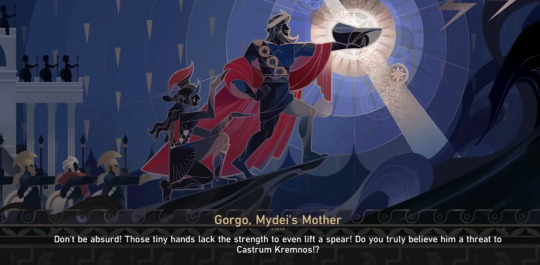

After nine years, he crawled out of the sea (possibly motivated by witnessing Tribbie's "star" in the sky). On the same day (or very near it), he met with a band of Kremnoan exiles.

Whether this was a larger group already, constituting a small "detachment" army of exiles, or just started with the five exiled friends and Mydei then grew into a small army by picking up other exiles over time, is still unclear. However, at this point, Mydei makes no mention of returning to Kremnos and instead goes straight from "leaving the sea" to "living ten years in exile:"

This is the key point of inconsistency between the two "halves" of Mydei's story--either he lived in Kremnos or he didn't. We can handwave here and say "Yes, he returned to Kremnos with his friends and they just hid their identities, leaving Kremnos years later in a self-imposed exile," but the story gives us absolutely no indication that this realistically could have happened. Mydei never once mentions hiding his identity, changing his appearance, or living a double life in the city, and never explains how he would have had access to the inner city of Kremnos ("as befitting a crown prince") and the royal library, yet still go totally unnoticed by his father or anyone loyal to Eurypon, including Krateros. (There's also no explanation at all for why he would have wanted to return to a city ruled by someone who tried to murder him and where he would have had to live life under a fake identity just to get by, but you know...)
Instead, the game does give us several pieces of information indicating that the five Kremnoan exiles did not return to Kremnos after meeting Mydei:
First, Mydei's character stories confirm that Mydei deliberately hid his name while traveling in exile across Amphoreus, indicating that he knew he would be recognized by Eurypon/Eurypon's loyalists if he didn't hide his identity. This awareness suggests it is extremely unlikely that Mydei could have returned to Kremnos without being identified:

This also suggests that, at this point in this timeline, no one in Castrum Kremnos knew for sure that Mydeimos had survived being thrown into the Sea of Souls and returned. This is further confirmed by a memory fragment where Krateros says there has been a "rumor" that the leader of the exiled Kremnoan army is one who "defied death." Krateros alone makes the assumption that this could be Mydei and decides to defect to aid him:

This memory suggests two things clearly: Mydei was not living in Kremnos at the time Krateros defected, and the exile of all of Mydei's friends must have taken place before they met Mydei, years in the past, as there is no way an entire small army could have been exiled from Kremnos, with Mydei in toe, and not at all attract Krateros's attention until after they were gone.
The idea that Mydei never returned to Kremnos is further enforced by Eurypon, who did not recognize Mydei when he confronted him, to the point that he didn't believe Mydei was even Kremnoan. This suggests that Eurypon not only didn't know Mydei's true identity--he'd never seen him before at all, making it extremely unlikely that Mydei was walking around Castrum Kremnos, talking to Chryseus Leo, and reading in the royal library all under some false identity for years. Eurypon certainly wouldn't have been capable of exiling someone he'd never seen before from Kremnos, in any case!
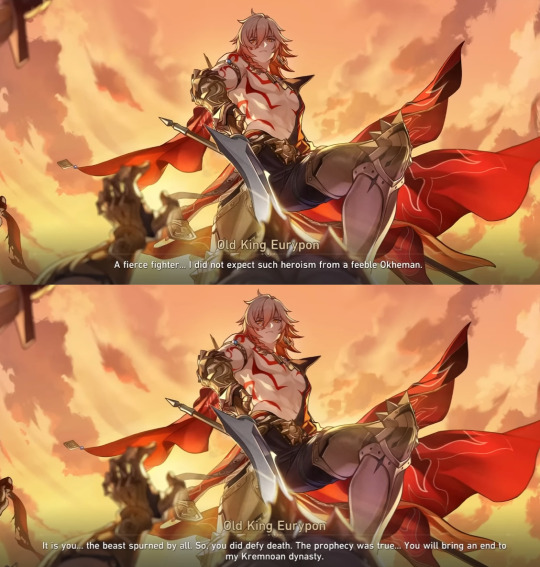
Therefore, we can assume the series of events in this timeline is pretty straightforward: Mydei entered the Sea of Souls as a baby, came out nine years later, went straight into a life of exile with his five friends, amassed power and support for ten years, and then returned to seek vengeance on his father.
The only remaining question in this timeline becomes "When did Mydei join up with Okhema?"
I think, in this timeline, it makes the most sense for Mydei to have only joined up with Okhema after killing his father. In 3.1, Mydei confirms to Phainon that all his friends died before he was able to kill his father, and that none of them ever made it to Okhema:

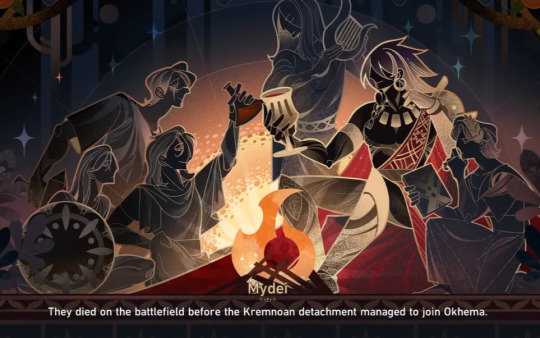
Therefore, the final order of events for the more prominent timeline is:
Dumped into the sea as an infant, nine years in the Sea of Souls
Ten years in exile with his friends amassing strength and support
Returns to Kremnos, kills his father, and the last of his friends dies that day
Then he defects to Okhema, leading any of the Kremnoans willing to follow him there.
By itself, this story makes perfect sense. If this was all the information we'd been given, there wouldn't have been any gaps.
Unfortunately, we also have a whole other set of information that massively conflicts with these events, which can only really be explained two ways: Either Hoyo messed up (again) and really dropped the consistency ball when it comes to writing Mydei's backstory... Or there's an entire separate timeline going on. Personally, I'm leaning toward the latter, because there are just too many seemingly deliberate fingers in the story pointing toward the inconsistencies for them to feel entirely unintentional to me.
Therefore, I propose that Mydei's memories are actually getting infiltrated by a second, entirely different timeline:
The "Gorgo Lives" Timeline
From 3.0 all the way to 3.2, we're given numerous pieces of information that point to a wholly different order to the events of Mydei's life, contrasting the story that Mydei tells Phainon in the Garden. At first, these events seem scattered and nonsensical, contradicting the "main" timeline in too many ways to be anything but errors... But when taken as a whole, we can build a second coherent timeline out of these events if we make one assumption: There is a timeline where Gorgo lived longer.
In the second timeline which is intruding on Mydei's memories, there appears to be one key point of divergence: Gorgo did not die dueling Eurypon. Either she never challenged him to the duel, or (more likely) she was never successfully poisoned, and therefore it's possible she won the duel, allowing her to rescue Mydei from the sea.
Working from that possibility, a second complete timeline emerges:
Mydei was thrown into the Sea of Souls as an infant but did not drift there for nine years. Instead, he was rescued and brought back to Kremnos, where he was allowed to grow up in the inner city, with access to both Chryseus Leo, who served as his teacher, and access to the royal library, which he is proud enough of to call "his" library. He is able to lead Phainon and the Trailblazer around Castrum Kremnos even in its ruined state because he grew up there, spending enough time there to know the city like the back of his hand:

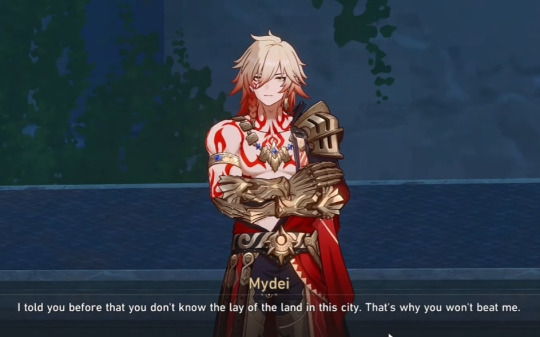
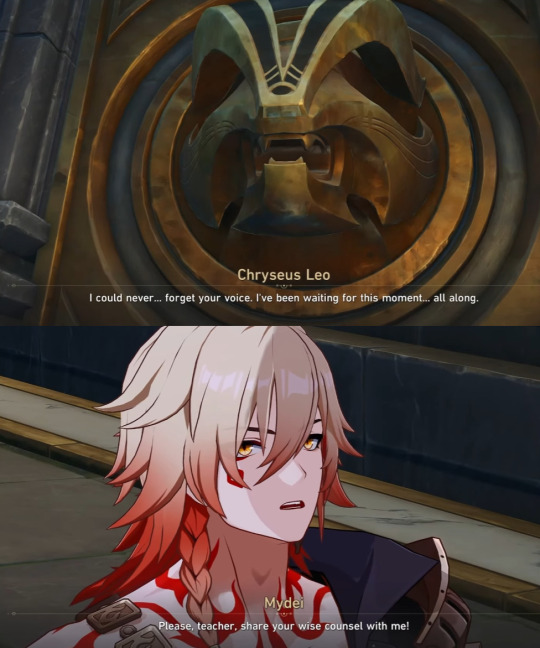
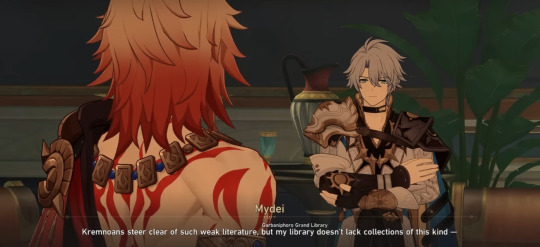
This is where we can slot in the inconsistent memories Mydei has of Gorgo:

(By the way, although Mydei writes this scene off as a dream, you can actually hear Oronyx's whisper play in the black screen seconds before this "dream" occurs...)
But okay, let's say this is just a wishful dream. Maybe this scene never happened. If all we got of Gorgo supposedly raising Mydei was this moment in 3.1, I might agree that it was just a dream (other than there being no reason to play Oronyx's sound effect there, but you know). However, in 3.2 they then hit us with this:

That's multiple moments now pointing to a timeline where Gorgo raised Mydei. Once is handwave-able--twice? That's deliberate.
In this secondary timeline, Mydei appears to have grown up as Kremnos's beloved crown prince, being warmly embraced by his people (at least until Kremnos fell into calamity). Apparently his days consisted of eating pomegranates, training for combat, playing with Kremnos's kids, and hanging out with his five friends. We see snippets of this idyllic life (along with his five friends appearing to be roughly the same age as him--something that likely wouldn't be true in the "main" timeline, by the way) on Mydei's long march back into Castrum Kremnos:


I know some people took this to be Mydei hallucinating or just wishfully imagining a life where he was able to be happy with his friends, possibly even some metaphorical "encountering the souls of the departed in a paradise," but I don't think this is true. Every single time Mydei phases in and out of this "hallucination," the visual effect and the sound effect of Oronyx are distinctly played--the exact same sound and visuals that play when Trailblazer activates Oronyx's prayer to jump between timelines.
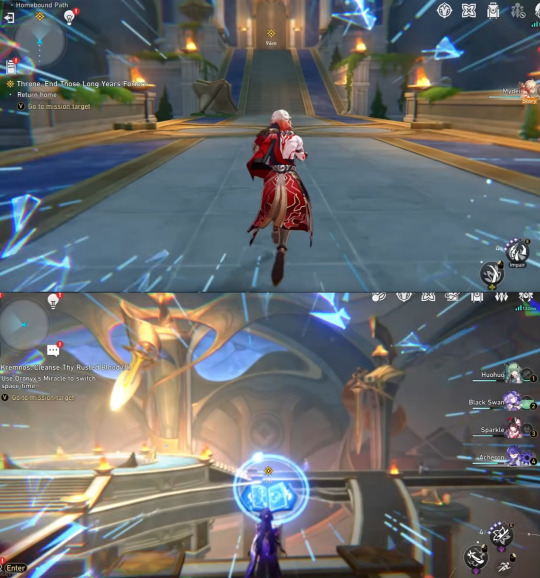
Mydei himself doesn't seem to quite understand what is happening to him in this moment, as you can hear him stumble and pant as he repeatedly goes through flashes of Oronyx's power. You can listen to comparison video clips on the prior post I made about Mydei's backstory.
Furthermore, if we work from the assumption that these moments actually represent a rupture between timelines, then the rest of the inconsistencies can finally be cleared up:
In 3.0, Mydei says that his choice to leave Castrum Kremnos was not a forced exile but a "self-imposed" one:

And this aligns with what he stated in the Garden of Life to Phainon, that he and his friends "left Castrum Kremnos" to go into this self-imposed exile, rather than having never returned to Kremnos from the sea:
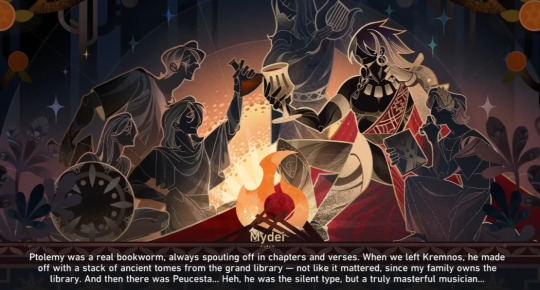
Furthermore, this also aligns with the angry NPCs in the past version of Castrum Kremnos that Trailblazer and Castorice travel back to:
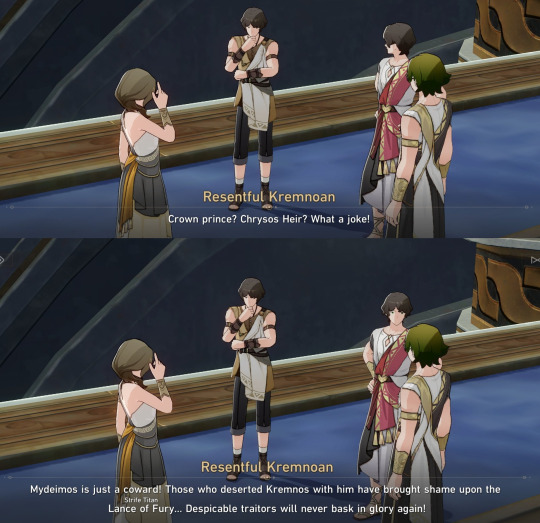
Remember that this version of Castrum Kremnos was supposed to be occurring while Eurypon was still alive, so there is absolutely no way this line makes sense in the same universe where Eurypon didn't even know Mydei had survived. There isn't any way, in "our" timeline, that Mydei could have been both the "crown prince" of Kremnos for these NPCs and completely unknown to his father, the king.
These NPCs, furthermore, directly accuse Mydei of "deserting Kremnos," suggesting that Mydei was living in Castrum Kremnos as their prince, and then abandoned them to join Aglaea in Okhema, getting himself and everyone who went with him labelled as "traitors to Kremnos" in the process. None of this makes sense in the context of a timeline where no one in Kremnos knew he had even survived.
Instead, all of these elements point to a different sequence of events:
Gorgo lived, likely winning her duel and thereby (likely) giving her the right to save Mydei from the Sea of Souls and bring him back to Kremnos. He was raised by his mother as the beloved crown prince of Kremnos. Then, years later, as his father and Nikador both descended into full madness, Mydei and the Kremnoan detachment defected.
But what would have triggered this sudden need to defect after years of leading Kremnos as a well-liked prince?
The flashback between Mydei and Eurypon actually suggests a possible reason:

Apparently, at some point, in some timeline, Mydei knew about Eurypon's plan to break Nikador's divinity into separate parts and seal him away, harnessing the power of their titan for himself.
Yet the Mydei of 3.0 seems to have no idea about any of this, never able to give any explanation for how Nikador has degraded so much nor why Nikador is seemingly unkillable. Castorice, Mem, and the Trailblazer have to come up with the idea to go back in time to the past Kremnos by themselves, because Mydei never makes any mention of there ever having been a plot to break up and seal away Nikador's divinity, even when they walk past the very blades that did the sealing.

Finally, there's one last piece of conflicting information: While talking to Phainon in the Garden of Life, Mydei states that all of his friends died before the detachment could ever join up with Okhema and that all of their deaths occurred by the time he went to kill his father. But this conflicts with the NPCs above, who state that Mydei had already defected to Okhema and joined the Flame Chase Journey as a Chrysos Heir while his father was still alive.
This inconsistency is further reinforced by a memory fragment with Krateros, who confirms that Mydei had joined up with Okhema already before killing his father:

Putting all of this together, the complete series of events for this second timeline becomes:
Infant Mydei is quickly rescued from the Sea of Souls, is instead raised by his mother, and grows up as the crown prince of Castrum Kremnos with his five friends.
At some point, years later, he discovers Eurypon's plot to break up and imprison Nikador's divinity, and he and his friends and supporters defect from Kremnos as a result.
Either they go straight to Okhema (I'm inclined to say that "ten years of wandering" doesn't fit, chronologically speaking, into this secondary timeline) or they do wander a bit, but ultimately, Mydei reaches Okhema and aligns with Aglaea before killing his father.
After aligning the Kremnoan Detachment with Okhema, Mydei returns to Castrum Kremnos to kill his father, possibly to halt Eurypon's evil plan to harness Nikador's power.
At some point in this timeline, presumably before Mydei returns to kill his father, Gorgo likely still dies (possibly killed by Eurypon and/or Nikador), which explains why the Gorgo in the Sea of Souls seems to be the one convinced that she raised Mydei.
And this is just pure personal speculation, because there isn't enough evidence to really confirm it, but I almost feel like we can even pinpoint how/when the whole decision to defect to Okhema took place. At the end of Mydei's flashbacks to the "peaceful" Kremnos, Peucesta says that Mydei has been away from Kremnos for a while.

Leonnius assumes that Mydei was away on some apparently extended training trip, but this moment specifically ends with Gorgo welcoming Mydei home and asking him one very important question:

Obviously these lines are doing double duty, symbolically welcoming the present Mydei back to the ruins of Castrum Kremnos and asking him whether he's finally ready to take on his role as the "Guardian of Amphoreus." But as the wiki notes, this takes place in a flashback to the past, and for the "Mydei of the past" (aka the Mydei of the alternate timeline), this could very well have been Mydei disappearing from Kremnos to make contact with Aglaea in Okhema, and Gorgo questioning him about his decision to commit himself to the Flame Chase Journey, leading up to an ultimate and permanent defection from Kremnos. (This is just speculation though, trying to tie the last few loose ends together.)
Anyway, when taken from this perspective, that there are two separate backstories here, one from a world where Gorgo lived and the more prominent one where she died, we can sort all the seeming inconsistencies in Mydei's backstory into two surprisingly tidy and complete timelines.
I haven't yet found anything in any Mydei scene that doesn't fit one of these two scenarios, so I'm starting to definitely feel optimistic here that this writing was intentional, and that the "contradictory" backstory we're seeing for Mydei isn't "the worst continuity Star Rail has served up to date," but instead an actual deliberate choice to present us with a character whose memories are a hodge-podge of two divergent timelines, snippets of one timeline constantly erupting and "filling in the blanks" of the other.
I think this would be a fascinating way to lead up to the idea that Amphoreus's world isn't real, that it's a cobbled together story or set of memories that someone is barely holding together, and that it's constantly cyclical in nature, with events repeating with slight variations across times. The idea that Mydei is actually experiencing two different sets of memories crushed together into a tangled jumble and that he's only just now starting to become aware of the discrepancies would be such an excellent way to reinforce the "unreality" of Amphoreus's plot as a whole.
I really hope this is the direction that they take the story... Or at least that I won't one day be looking at all my Mydei posts and sadly thinking to myself that I put a lot more thought into the character's backstory than his own writers did, RIPPPPP. 😂😂😂
Cope with me, people!
1K notes
·
View notes
Text

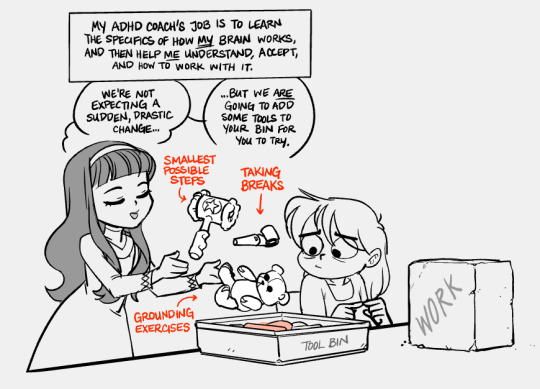

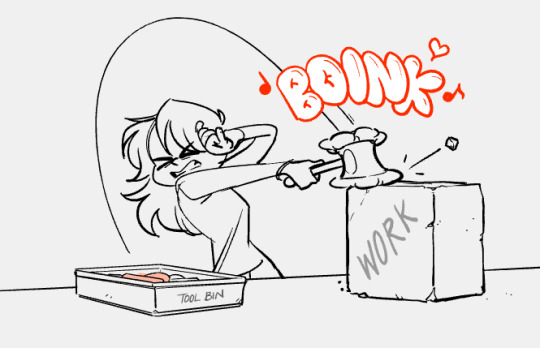


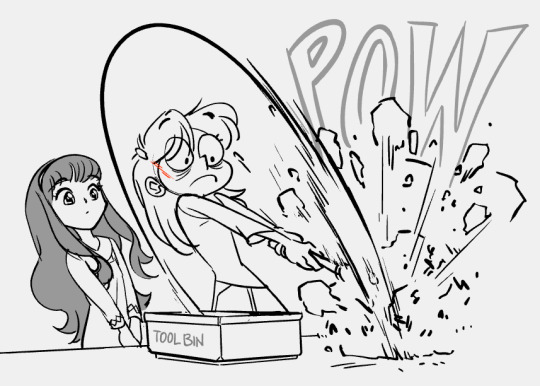
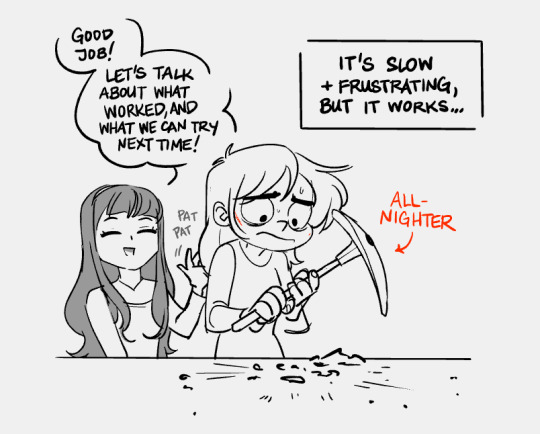
time + work = healing (a soft sequel to this comic)
(Boulet is a phenomenal French writer and artist who will draw his friends as recognizable fictional characters in his autobio comics for their privacy.)
9K notes
·
View notes
Text
Everyone who still says they didn’t want Amphoreus to be a simulation because that means none of it and no one matters needs to sit down with me real quick
Do you know who you sound like? Lygus. He told Khaslana and Cyrene that everything in Amphoreus was just kindling for the fire. Their lives didn’t matter. The gods didn’t, the people didn’t, the history and mythology of the world didn’t
And you know what they said? Fuck you. Not in those terms, ofc, but don’t forget how Phainon literally yelled at Nanook about how Amphoreus was the aeon’s forgotten, abandoned children, and how they would strike back
Lygus kept talking about how this extrapolation proved what the prime mover of life was, but he failed to understand the fundamental question of “what is life?”
This quest spoke about that answer, too. And it wasn’t just Phainon/Khaslana and Cyrene. No, no, no—all the Chrysos Heirs proved it. When Khaslana told them that this was the 100th, the 1000th, the 10000th, etc. cycle, and that they lost and died in every cycle, the heirs did not stop fighting. They fought for themselves, and their homelands, and their beliefs, and some—Anaxa, Castorice, Hyacine—even fought for Khaslana, for his humanity
They might have been simulations give form by Irontomb, but they gave themselves life. And you can’t say anything about their pursuits not meaning anything just because they’re “meaningless strings of numbers”
361 notes
·
View notes
Text
sexy knights. sexy wounded knights. sexy wounded weary knights. sexy wounded weary knights in the rain. sexy wounded weary knights in the rain pledging their loyalty to you.
64K notes
·
View notes
Text
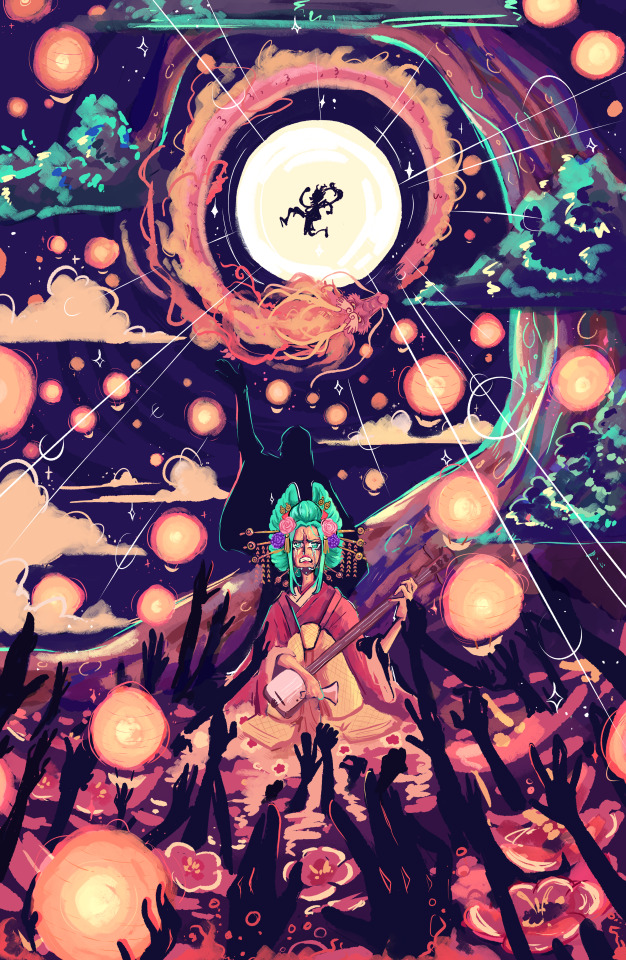
You are the moon unaware of the dawn!
3K notes
·
View notes
Text
Here are a bunch of B. Dylan Hollis's recipes typed up in google docs for those who want to make these recipes.
I've only got a few so far, but I'll continue to type up the ones he likes and add them here. Shoot me an ask if you have any requests for recipes to type up, but please check the original version of the post first. When I add new recipes, I edit the original post and then srb it for others to see.
DISCLAIMER: A lot of his videos he goes pretty fast or does not include exact measurements, so they may not be 100% accurate, but I'm typing them up to the best of my abilities.
Scotcheroos
Chow Mein Cookies
Ice Cream Cone Cupcakes
Deep Fried Oreos
Corn Starch Cookies
Copycat Almond Joys
Magic Peanut Butter Cookies
Cowboy Cookies
Leftover Bread Pancakes
Avocado Ice Cream
Avocado Bread
Magic Cinnamon Sticks
Peanut Butter Bread
Peppermint Patties
Christmas Crack
Eggnog
Apple Cider Cookies
Baked Apples
Deep Fried Cookie Dough
Potato Chip Cookies
Chocolate Zucchini Bread
11K notes
·
View notes
Text

The Fae Prince and the Recordkeeper
Lily's official title is "Recordkeeper". I played with a lot of titles: the scribe, the photographer, the chronicler, but none of them seemed to fit. Lily's role is to record the events of NRC, and it's not necessary only through written forms. Lily usually takes photos using the ghost camera given to her by Crowley, however her role is not just to photograph, but to record. As such, I thought giving her the title of "Recordkeeper" was the most fitting
ⓒ encodory
2K notes
·
View notes
Text
Destigmatising lesbian desire applies to ace lesbians too. Our desire isn't 'redeemed' by puritans just because we're asexual. We're still seen as predatory lesbians bc lesbophobes don't care about distinguishing whether or not we're ace before being bigots.
It's not gross or disgusting to want women romantically. It's okay to kiss women and express that you want to kiss women. It's okay to hold hands with them. It's okay to touch them. It's okay to read lesbian smut and erotica even if you have 0 plans to do it irl. It's okay say you want a partner. It's also not wrong to desire women aesthetically. It's okay to express that you like how women's bodies look. It's okay to say you like their features and that you want to touch them and look at them. It's okay to say women are hot even if you have no sexual context behind it.
You're not ruining or corrupting ace characters when you headcanon them as being ace and lesbian. You're not 'perverting' the aspec community for simply having romantic attraction. And lastly, you're absolutely not 'corrupting' your own asexuality for being a lesbian. Generations of lesbian activists fought for our right to express ourselves. Even if it's just holding hands please don't be afraid to take up space. It's ours too, remember that.
49 notes
·
View notes
Text














just for fun, i thought i'd redraw an old soapbox comic to see how much i've improved! you can read the original from 2 years ago here.
early access + nsfw on patreon soapbox masterpost (scroll to bottom)
5K notes
·
View notes







